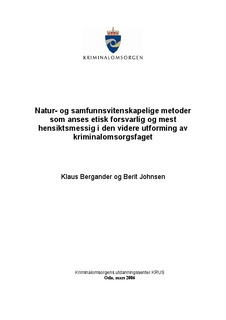| dc.description.abstract | This text is the result of an ongoing process in which the organizational level of the education
of prison officers at the Correctional Service of Norway Staff Academy (KRUS) is to change
from a college to a university college. It is characteristic of such a process that one wishes to
establish clear definitions of what the subject matter of correction and care within prison and
probation entails, and what one wants it to be in a scientific and academic context.
The purpose of the text is to generate a discussion about subjects and problems relevant to this
issue. We present several of them. Each of them is so complex that we have chosen just to
give a brief introduction. In this way, the reader is provided with a fundamental understanding
of their complexity. In the first two chapters, we present a general overview over different
ways of understanding and defining the concept of method, and we present similarities and
differences between qualitative and quantitative methods. Further, we present a theoretical
position from which the separation between social and natural science, and between empirical
data and theory is scrutinized and discussed. Then we introduce a comparative analysis as a
first attempt to define what the central subject matter of correction and care within prison and
probation could be.
In the next two chapters, on ‘evidence-based practice’ and ‘the concept of quality in practice’,
the relationship between the concepts of ‘method’ and ‘quality’ is discussed. The purpose
here is to illustrate that learning to use particular methods can contribute to a better quality of
the practice. These first four chapters constitute the fundament for our effort to describe what
the subject of correction and care within prison and probation ‘is’ or ‘should be’. We also try
to find out where and in what way the subject can be observed, and what it is that might be
seen as the essence of a subject of correction and care within prison and probation,
characterised by high quality.
In the final chapters, a system-theoretical approach to the subject of correction and care within
prison and probation is presented. We believe that such an approach can be helpful in trying
to understand the subject’s complexity. We then sketch a way of thinking that offers the
opportunity to analyse the Correctional Service in a flexible and practical manner. These
principles will be helpful in the development of the subject of correction and care within
prison and probation. We finish with a reflection within the realm of the philosophy of
science, emphasizing the importance of a systematic and critical approach when discussing
quality in a particular practice. | en_US |
